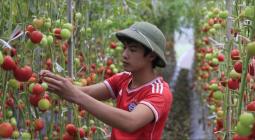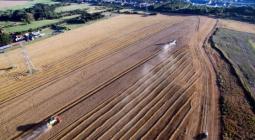South-Eastern winds fan farmers’ flames
The EU member states approved on Friday morning (9 February) the European Commission’s proposal for a derogation on land set-aside requirements. The measure was part of a package to appease farmers’ protests, which however continue in Southern and Eastern Europe.
The measure approved
The derogation on the requirement to leave 4% of land out of production to have the Common Agricultural Policy support will be suspended for 2024, under conditions.
On 31 January, the European Commission proposed exempting from the requirements those farmers growing on 7% of their land intermediate or nitrogen-fixing crops (lentils, weights, etc.) without pesticides.
The member states amended the measure in three points: they decreased the proportion of land from 7% to 4%; deleted a 0.3 coefficient on land for catch (intermediate) crops; and obtained a fast track procedure for possible needed changes in the eco-schemes, the regime of aids supporting agricultural practices which are additional to the 4% requirement.
But protests are not stopping in Southern and Eastern Europe.
As usual, local issues are mixing with the European big picture. We collected news and voices from the hotspots of the protests.
Spain
From 6 February, Spanish farmers have been blockading highways in several regions despite the authorities’ attempts to appease their discontent.
Socialist Prime Minister Pedro Sánchez pledged on Wednesday (7 February) to strengthen the national Food Chain Law, and to streamline the processing of Common Agricultural Policy (CAP) aids.
Still, farmers in Catalonia – facing water cuts up to 80% due to a historic drought – disrupted traffic in Barcelona on Thursday (8 February), and pulled in the regional parliament, reaching a deal with political parties, which agreed to revise water restrictions, speed up state aid payments and reduce bureaucracy.
In Madrid, demonstrators have threatened to enter Madrid on Saturday (10 February) and reach the governing socialist party’s headquarters. A big demonstration in Madrid is expected on 21 February.
Italy
In Italy, the protests are led from a galaxy of local organisations and the future developments are not clear. On Friday (9 February) four tractors paraded by the Colosseum in Rome representing hundreds of vehicles parked as a garrison along the city limits.
Some of the protesters are heading to Sanremo, in Liguria Region, where the Song Festival, the biggest national media event, is taking place.
Poland
Farmers resumed protests in Poland, blocking 260 roads all over the country on Friday.
On 31 January, the European Commission renewed the suspension of import duties and quotas on Ukrainian exports to the EU for another year, until 2025, while reinforcing protection for sensitive EU agricultural products.
The protection mechanism failed to satisfy the farmers, who believe it is too weak compared to the needs.
Bulgaria
Bulgarian grain producers began protests on Monday (4 February, blocking major roads across the country to demand compensation for the losses they have suffered from the collapse of world grain prices in 2023. They are demanding an additional 275 € million in government subsidies to compensate for their losses.
They insist on a calculation of subsidies per unit of cultivated area in order to have revenues similar to those of 2022, which was a very good year for Bulgarian grain producers.
Farmers’ other demands are duties (tax) on the import of agricultural products from Ukraine and the creation of a derogation for Bulgaria to implement this year the Common Agricultural Policy ecological requirement for crop rotation to preserve soil potential.
On Friday, the government proposed that only large farms, over 3,000 hectares, can prove their losses in order to receive help from the state government for the losses due to Russia’s war in Ukraine. A different kind of support is also proposed for the smallest farms.
Greece
On Thursday (8 February), farmers completely blocked the national highway connecting the Greek capital Athens to the northern part of the country.
On Friday, farmers blocked the border at Kilkis and this form of protest is expected to continue. About 20-30 trucks with imported goods from third countries usually use that crossing daily.
Beekeepers, fishermen, farmers from heavily affected areas from fires and floods, like Thessaly, and other operators of the primary production sector participate in the protests. A meeting with the government is expected on 13 February.
Why are farmers (still) protesting?
Continuing with our series of interviews, we spoke to Ricard Huguet, who represents young farmers in Catalonia, Spain. Asked about the timing of the protests in Spain, he said that, while mass demonstrations in Europe have had a contagious effect and encouraged mass participation, rural areas have long been a hotbed of discontent.
Huguet’s concerns range from excessive bureaucracy to “hypocrisy” in decisions on sustainability and trade.
He said environmental requirements are necessary but “forcefully” imposed on farmers while other economic sectors – such as tourism – are left untouched. He also mentioned free trade agreements and the fact that European farmers “cannot compete” with others in certain third countries with lower labour and sustainability standards.
He warned that, if political parties do not tackle the feeling of abandonment in rural areas, others will eye the opportunity, and pointed to the far-right. “It’s happening in Spain and across Europe,” he added.
We also interviewed Louise Fresco, a Dutch food scientist and former president of the top global agrifood University of Wageningen. She told us that farmers’ discontent is the tip of a more general social malaise, as they represent the resentment of the many other parts of the society unable to keep up with the pace of EU and national regulations, in particular on environment.
Fresco warned that the Commission’s strategic dialogue may not be enough to solve farmers and food issues, and called for a new agriculture and food policy that is attentive to differences among farmers, EU countries and their competitiveness.
News of the week
The Greens urged the EU executive to take action on agriculture, calling for a tax on windfall food profits. The Greens in the European Parliament have become the latest party to woo farmers ahead of June’s EU elections, sending a letter to the European Commission on Monday (5 February) outlining their vision and demands for agriculture.
The Greens focused on a fair income for farmers and urged actions to address the imbalances in the food chain, such as introducing a windfall tax on agrifood products or reinforcing the EU’s Unfair Trading Practices Directive.
Meanwhile, a report commissioned by the Committee of the Regions (CoR) confirmed the grip of Eurosceptic parties on rural areas.
The authors said that some EU policies have “inevitable disproportionate impacts on rural areas,” adding that this gives national authorities the opportunity to blame the EU.
The European Parliament adopted its position on gene-edited plants. MEPs voted on Wednesday (7 February) to set new rules for the highly controversial new genomic techniques (NGTs), which currently fall under the more restrictive framework for genetically modified organisms (GMOs).
Lawmakers agreed to create two categories for NGT-based plants: those which should be treated like their conventional counterparts (NGT 1); and those which would still have to follow stricter rules (NGT 2). The European Parliament agreed to have mandatory labelling for both categories and to keep them all out of organic production.
The ball is now in the court of the EU Council which, hours after the vote in the European Parliament, tried and failed to seal a deal as member states remain divided over the patentability of NGTs.
MEPs also updated EU regulations for tuna fishing on Tuesday (6 February), harmonising rules within the EU and third-country fleets for tuna fishing. While the measures received unanimous support, some environmentalists raised concerns over poor distribution quotas for small-scale fishing.
The rules commit the EU to new fishing standards, strict catch declarations and catch monitoring for tropical tuna, such as Mediterranean albacore and North and South Atlantic albacore. The text also insists on reducing by-catches of sea turtles, in particular by respecting fishing closures where there is a risk of interactions with these species.
Cover photo: Euractiv is part of the Trust Project >>>




